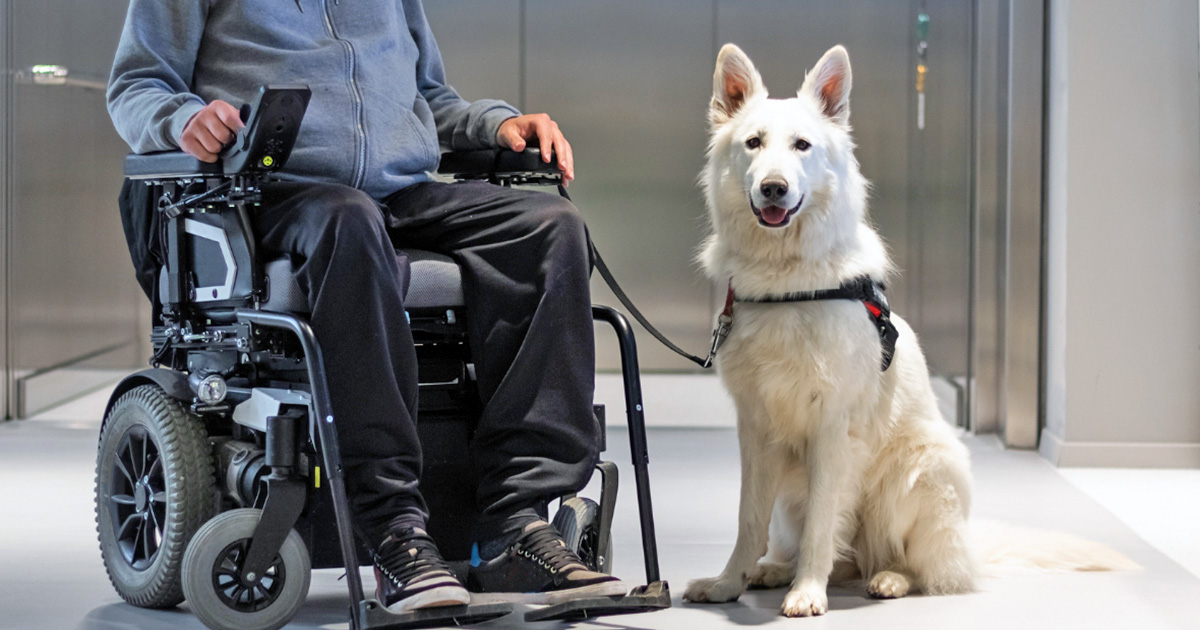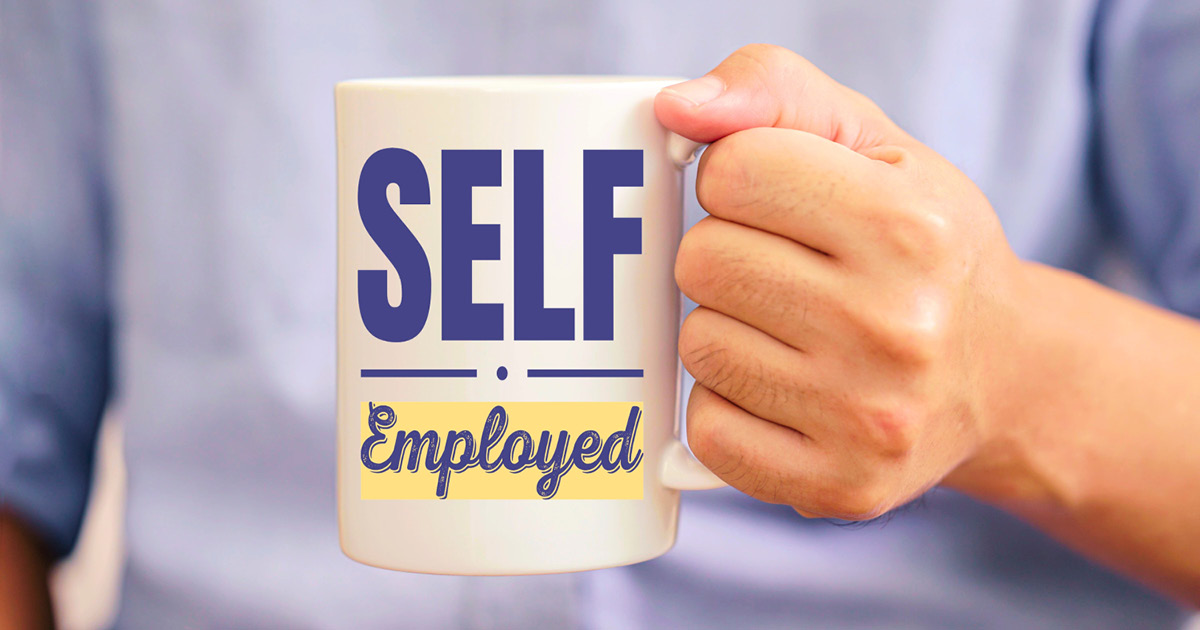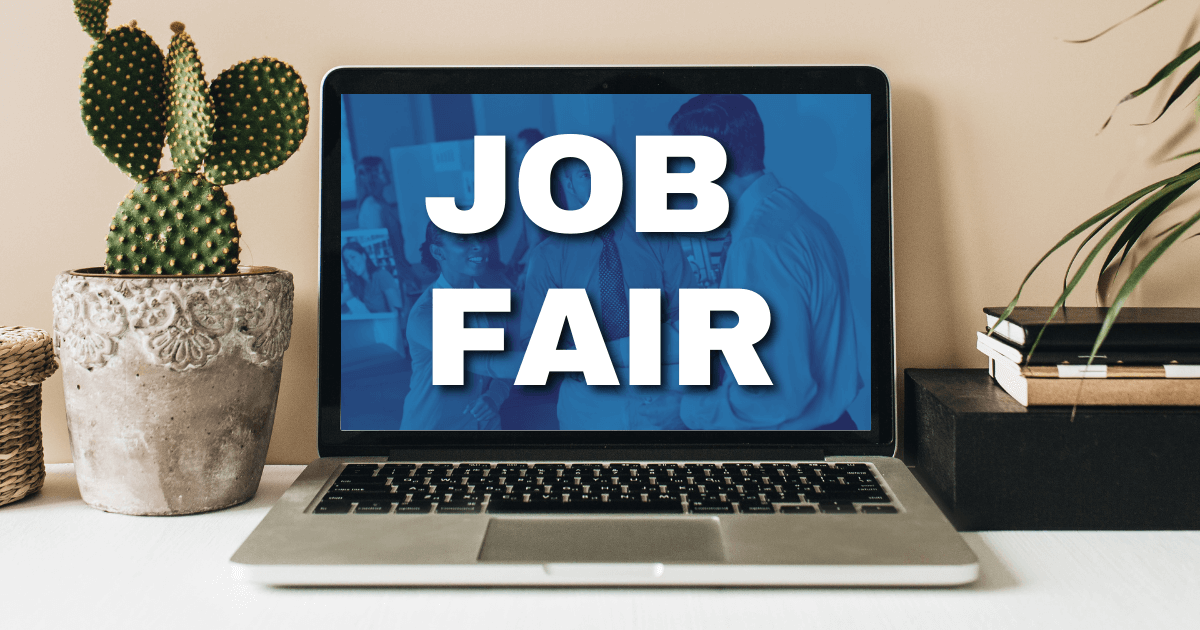 In the first post of this series, we broke down what the Americans with Disabilities Act (ADA) actually says — and doesn't say — about service animals. We also tackled frequently asked questions related to the hiring process and shared useful strategies for discussing service animals with potential employers. Now, in this next installment, we're shifting focus to the workplace itself, answering common questions about having a service animal on the job once you have been hired or are already employed.
In the first post of this series, we broke down what the Americans with Disabilities Act (ADA) actually says — and doesn't say — about service animals. We also tackled frequently asked questions related to the hiring process and shared useful strategies for discussing service animals with potential employers. Now, in this next installment, we're shifting focus to the workplace itself, answering common questions about having a service animal on the job once you have been hired or are already employed.
How Can I Help My Co-workers Understand My Service Animal?
Your boss must keep your medical and accommodation details private, but you can choose to talk to your co-workers about your service animal if you want to. This can help everyone feel more comfortable and know how to act around your animal.
If you're okay with it, you can explain things yourself. If not, you can ask someone else to help. For example:
- The person or group who trained your service animal
- Your Employment Network or State Vocational Rehabilitation (VR) agency
- A local independent living center
These places may be able to teach your co-workers how to behave around service animals.
Want more tips? Check out JAN's guide: A Guide for Coworker Interaction with Service Animals in the Workplace..
What if a Co-worker Is Allergic to My Service Animal?
If your co-worker has an allergy defined as a disability under the ADA — or even if they have a significant allergy that isn't classified as a disability — your employer should try to find a way to support both of you. There might be a solution that lets you keep using your service animal at work without causing health issues for your co-worker.
This could mean changing workspaces, using air filters, or adjusting schedules — whatever helps both of you do your jobs comfortably.
Want to learn more? Check out JAN's blog: Service Animals and Allergies in the Workplace.
Where Can My Service Animal Stay During the Workday?
During the workday, a service animal typically stays with its handler at all times, including at their workstation. Under the ADA, employers are expected to make reasonable accommodations to ensure the animal can remain safely and comfortably nearby. This might mean providing a quiet space for the animal to rest, ensuring access to water, or allowing for periodic breaks so the handler can tend to the animal's needs. The key is that the accommodation should support both the employee's ability to work and the animal's well-being — without disrupting the workplace.
When it comes to meetings, travel, or off-site work, service animals are generally allowed to accompany their handler wherever the job takes them. Whether it's a client visit, a conference, or a business trip, the ADA protects the employee's right to have their service animal present, as long as the animal remains under control and doesn't pose a safety risk. That said, it's wise to plan. Confirming hotel policies, transportation logistics, and any venue-specific rules can help avoid surprises and ensure smooth access.
Can I Ask for Breaks to Take My Service Animal Outside to Relieve Itself?
If your standard break schedule doesn't give you enough time to take your service animal outside to relieve itself, it's reasonable to request a modified break arrangement. Employers are expected to consider adjustments as part of a reasonable accommodation under the ADA. That said, they aren't required to offer additional paid break time — but they may need to rearrange your existing breaks or allow extra unpaid breaks to meet your needs.
Open communication is key here. A respectful conversation with your employer can help ensure both your responsibilities and your service animal's needs are supported throughout the workday.
What is Ticket to Work?
Social Security's Ticket to Work (Ticket) program supports career development for people ages 18 through 64 who receive Social Security disability benefits (SSDI/SSI) and want to work. Through this free and voluntary program, eligible participants can work with service providers to receive the supports and services they need to find and maintain employment as they move toward financial independence through work.
Practical Support from a Ticket to Work Provider
Social Security's Ticket to Work (Ticket) Program is designed to help people who receive SSDI and/or SSI, are ages 18 through 64, and want to work to gain financial independence. Did you know your Ticket Program service provider can support you even after you have a job? Here are some ways they can help:
- Reasonable Accommodation Guidance. They can help you understand your rights under the ADA and assist in requesting reasonable accommodations — like modified break schedules, designated rest areas for your service animal, or access to off-site locations.
- Employer Communication. If you're unsure how to approach your employer about your service animal, your service provider can coach you through those conversations or even help mediate, ensuring your needs are clearly and respectfully communicated.
- Workplace Education. They may offer resources or training materials to help educate co-workers and supervisors about service animals — what they do, how to interact (or not interact) with them, and why they're essential to your success at work.
- Problem Solving. If issues arise — like a co-worker's allergy, misunderstandings, or logistical challenges — your provider can help brainstorm solutions that balance everyone's needs while protecting your rights.
- Ongoing Advocacy. Even after you're settled into your role, they can continue to advocate for you, helping to adjust accommodations as your job evolves or if your service animal's needs change.
To start with the Ticket Program and access these services, you can call the Ticket to Work Help Line 1-866-968-7842. For callers who are deaf, hard of hearing, or have a speech disability, call 1-866-833-2967 (TTY). Hours are Monday through Friday, 8 a.m. - 8 p.m. ET. You can also send us an email at TicketToWork@ssa.gov.
 Bringing a service animal to work can be a vital part of maintaining independence and managing a disability — but understanding your rights in the workplace is not always straightforward. While the Americans with Disabilities Act (ADA) provides protections and allows employees to request reasonable accommodations, it doesn’t specifically address service animals in employment settings. That can leave many workers unsure of how to proceed. In this two-part blog post series, we will break down what the ADA does and does not say, answer common questions, and offer practical tips for talking with employers about bringing a service animal to work.
Bringing a service animal to work can be a vital part of maintaining independence and managing a disability — but understanding your rights in the workplace is not always straightforward. While the Americans with Disabilities Act (ADA) provides protections and allows employees to request reasonable accommodations, it doesn’t specifically address service animals in employment settings. That can leave many workers unsure of how to proceed. In this two-part blog post series, we will break down what the ADA does and does not say, answer common questions, and offer practical tips for talking with employers about bringing a service animal to work. If you're entering the job market for the first time, you might be unsure where to begin, especially when it comes to writing your resume. You have likely heard that a resume should highlight your work experience and the skills you have gained from previous jobs. But what if you haven't had one yet?
If you're entering the job market for the first time, you might be unsure where to begin, especially when it comes to writing your resume. You have likely heard that a resume should highlight your work experience and the skills you have gained from previous jobs. But what if you haven't had one yet? Career fairs are an excellent way to start or advance your job search. Whether they’re in person or online, job fairs let you engage with potential employers and learn about job openings. If you’re aware of an upcoming job fair that our readers would find helpful, please email us at
Career fairs are an excellent way to start or advance your job search. Whether they’re in person or online, job fairs let you engage with potential employers and learn about job openings. If you’re aware of an upcoming job fair that our readers would find helpful, please email us at  Have you ever dreamed of working on your own terms — setting your own hours, choosing your clients, and building something that reflects your talents and values? For many people with disabilities, self-employment offers not just a source of income, but a sense of control, creativity, and purpose. Whether it's turning a hobby into a source of income or launching a full-fledged business, working for yourself can be empowering.
Have you ever dreamed of working on your own terms — setting your own hours, choosing your clients, and building something that reflects your talents and values? For many people with disabilities, self-employment offers not just a source of income, but a sense of control, creativity, and purpose. Whether it's turning a hobby into a source of income or launching a full-fledged business, working for yourself can be empowering. Looking for a job? Your resume, cover letter, and portfolio show employers who you are and what you can bring to their organization. Understanding their purpose can help you make the most of each of them. Let's break it down.
Looking for a job? Your resume, cover letter, and portfolio show employers who you are and what you can bring to their organization. Understanding their purpose can help you make the most of each of them. Let's break it down. Career fairs are an excellent way to start or advance your job search. Whether they’re in person or online, job fairs let you engage with potential employers and learn about job openings. If you’re aware of an upcoming job fair that our readers would find helpful, please email us at
Career fairs are an excellent way to start or advance your job search. Whether they’re in person or online, job fairs let you engage with potential employers and learn about job openings. If you’re aware of an upcoming job fair that our readers would find helpful, please email us at  This month marks the 35th anniversary of the Americans with Disabilities Act (ADA)! Signed into law in July 1990, the ADA gives people with disabilities the right to request reasonable accommodations in the workplace. Reasonable accommodations are adjustments to a job or work environment that can help make tasks more manageable and jobs more accessible. These accommodations often come at little or no cost and can improve the overall work environment for everyone.
This month marks the 35th anniversary of the Americans with Disabilities Act (ADA)! Signed into law in July 1990, the ADA gives people with disabilities the right to request reasonable accommodations in the workplace. Reasonable accommodations are adjustments to a job or work environment that can help make tasks more manageable and jobs more accessible. These accommodations often come at little or no cost and can improve the overall work environment for everyone. When it comes to finding a job, who you know can matter just as much as what you know. In fact, studies — including one from
When it comes to finding a job, who you know can matter just as much as what you know. In fact, studies — including one from  Career fairs are an excellent way to start or advance your job search. Whether they’re in person or online, job fairs let you engage with potential employers and learn about job openings. If you’re aware of an upcoming job fair that our readers would find helpful, please email us at
Career fairs are an excellent way to start or advance your job search. Whether they’re in person or online, job fairs let you engage with potential employers and learn about job openings. If you’re aware of an upcoming job fair that our readers would find helpful, please email us at